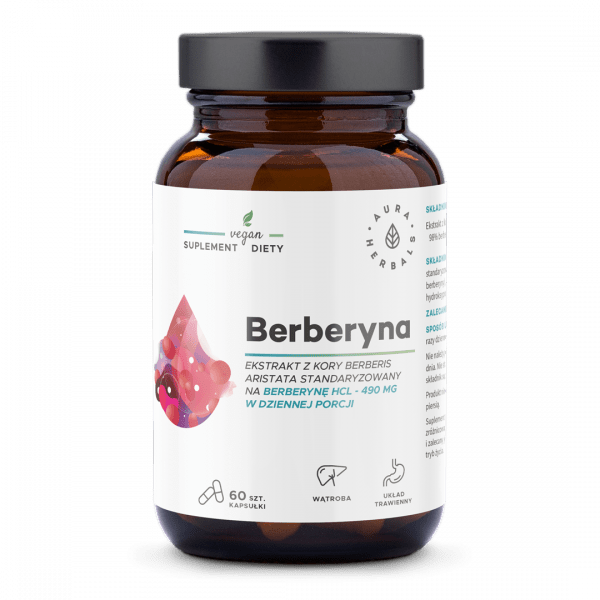Ostatnio szum wokół ekstraktu ziołowego o nazwie berberyna, nazywanego „naturalnym ozempicem”, gwałtownie wzrósł – i nie bez powodu. Berberyna to silny fitoskładnik o udowodnionych właściwościach hipoglikemicznych, antylipidemicznych i wspomagających metabolizm – mówiąc prościej, pomaga regulować poziom cukru we krwi, magazynować tłuszcz i metabolizm energetyczny.
Ozempic (lub Semaglutide) to lek do wstrzykiwań na cukrzycę typu 2, który budzi kontrowersje. Początkowo lek był dostępny wyłącznie na receptę, ale sytuacja się zmieniła, gdy FDA zatwierdziła jego stosowanie jako powszechnego leczenia otyłości. Od tego czasu lek podbił świat; rząd Wielkiej Brytanii ogłosił nawet inwestycję w wysokości 40 milionów funtów w pilotażowy program testowania cotygodniowych zastrzyków odchudzających, aby zwalczyć kryzys otyłości w tym kraju. Jednak powszechne stosowanie Ozempicu wywołało ożywioną debatę na temat etycznych i społecznych implikacji promowania szybkich rozwiązań odchudzających zamiast zmian stylu życia, zwłaszcza gdy jego skutki uboczne, w tym ostrzeżenie o raku tarczycy (najwyższej klasy ostrzeżenie FDA dotyczące bezpieczeństwa), są tak ekstremalne. Być może najważniejsze jest to, że gwałtowny wzrost popularności leku wśród osób, które nie wymagają jego stosowania z przyczyn medycznych, doprowadził do powszechnych niedoborów, co oznacza, że osoby najbardziej potrzebujące leku, u których istnieje ryzyko powikłań związanych z otyłością, mogą nie mieć do niego dostępu.
Ze względu na udowodniony wpływ na metabolizm, berberyna jest porównywana do leku, ale te dwa środki bardzo się różnią. Oto, co musisz wiedzieć.
Najpierw omówmy jak działa Ozempic.
Ozempic i Wegovy to nazwy handlowe leku Semaglutide, który należy do klasy leków znanych jako agoniści receptora GLP-1 (GLP-1 RA), ponieważ naśladuje działanie peptydu glukagonopodobnego-1, naturalnego hormonu uwalnianego w odpowiedzi na jedzenie. Jedną z funkcji GLP-1 jest pomoc w ograniczaniu spożycia pokarmu i apetytu poprzez różne działania na insulinę i glukagon – dwa ważne hormony regulujące metabolizm i magazynowanie tłuszczu. Powoduje również opóźnienie opróżniania żołądka, co może pomóc nam dłużej czuć się sytym. To działanie na żołądek może wyjaśniać niektóre z najczęstszych działań niepożądanych leku, które obejmują nudności, biegunkę, ból brzucha i zaparcia. Oprócz długiej listy działań niepożądanych, Semaglutide ma poważną wadę – uczestnicy mają tendencję do odzyskiwania całej utraconej masy ciała po zaprzestaniu jego stosowania. Ponadto odwraca uwagę i finansowanie od podstaw leczenia otyłości, które polegają na długoterminowych zmianach w odżywianiu, stylu życia i aktywności fizycznej.
Poznaj Berberynę.
Berberyna to fitoskładnik stosowany w medycynie tradycyjnej od 3000 r. p.n.e., którego korzyści metaboliczne potwierdzono ponad 20-letnimi badaniami klinicznymi. Jej długa lista działań jest imponująca: w kontekście metabolizmu wykazano, że poprawia wrażliwość na insulinę, zwiększa rozkład glukozy, zmniejsza produkcję glukozy w wątrobie, zwiększa produkcję tlenku azotu, spowalnia wchłanianie węglowodanów w jelitach, hamuje adipogenezę (tworzenie się komórek tłuszczowych), stymuluje utlenianie kwasów tłuszczowych, wspomaga utratę wagi i poprawia funkcjonowanie mitochondriów. Co więcej, ma również właściwości przeciwbakteryjne, przeciwzapalne, antyoksydacyjne i neuroprotekcyjne. W medycynie tradycyjnej rośliny zawierające berberynę są stosowane w wielu dziedzinach, od poprawy energii, przez leczenie zespołu metabolicznego i kontrolę masy ciała, po odporność, stany zapalne i zaburzenia równowagi jelitowej.
Berberyna kontra Ozempic.
Tak, berberyna ma wiele korzystnych właściwości wspomagających kontrolę masy ciała i ogólny stan zdrowia metabolicznego, ale jej mechanizm działania różni się od mechanizmu działania Ozempicu. Podczas gdy Ozempic działa na receptory GLP-1, berberyna wywiera swoje działanie metaboliczne poprzez aktywację kinazy białkowej aktywowanej przez AMP (AMPK). AMPK jest centralnym regulatorem energii i uczestniczy w wielu szlakach metabolicznych związanych z regulacją poziomu cukru we krwi, sygnalizacją insuliny, biogenezą mitochondriów, spożyciem pokarmu i masą ciała.
Berberyna ma kilka interesujących właściwości dla jelit. Ze względu na swoje działanie przeciwdrobnoustrojowe pojawiły się obawy dotyczące jej negatywnego wpływu na zdrowie i różnorodność naszego mikrobiomu. Chociaż potrzebne są dalsze badania, wstępne badania wskazują, że ma ona odwrotny skutek; wykazano, że hamuje wzrost niektórych bakterii patogennych i sprzyja rozwojowi pożytecznych bakterii, takich jak Akkermansia spp. To działanie uzasadnia stosowanie berberyny w medycynie funkcjonalnej jako suplementu wspomagającego leczenie SIBO, a badanie z 2014 roku wykazało, że ziołowe leczenie SIBO było równie skuteczne jak leczenie antybiotykiem Rifimaxin, bez negatywnych skutków ubocznych, których doświadczała grupa leczona antybiotykami.
Czy zatem berberyna to naturalny ozempic?
Berberyna to skuteczny i bezpieczny fitoskładnik, który, jak wykazano, wspomaga utrzymanie prawidłowego poziomu cukru we krwi, utratę wagi, zdrowie metaboliczne i naśladuje niektóre efekty działania Ozempicu i metforminy. Należy jednak jasno powiedzieć: berberyna nie doprowadzi do tak szybkiej utraty wagi, jak Ozempic. Ozempic to syntetyczny lek, którego działanie jest dalekie od naturalnego (i potencjalnie niebezpieczne dla osób bez potrzeby leczenia), a znalezienie w naturze czegoś, co naśladowałoby działanie tak ekstremalnego leku, jest mało prawdopodobne. Berberyna oferuje natomiast zdrowszy i skuteczniejszy sposób na aktywację szlaków komórkowych, które mogą poprawić zdrowie metaboliczne, co może być doskonałym rozwiązaniem dla osób poszukujących wsparcia metabolicznego, które nie potrzebują lub nie powinny stosować tak drastycznych środków farmaceutycznych.

